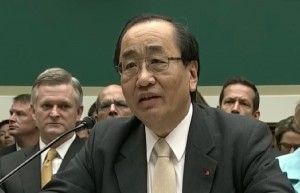Safety is the top priority, said Department of Transportation Secretary Anthony Foxx, and the expanding recall of potentially defective Takata airbags will proceed, even if that means putting the Japanese supplier out of business.
Takata produced the airbag inflators involved in the recall of about 24 million vehicles in the U.S. alone, devices so far linked to 13 fatalities worldwide. NHTSA last week announced it would add another 35 million to 40 million more Takata airbags on the recall list.
There have been growing concerns that the expanded recall could put Takata out of business, but Foxx said that “can’t be the top concern we face,” during a Wednesday roundtable with reporters. “The airbags need to be recalled, and we have a responsibility to recall them.”
(For more on the expanding NHTSA recall, Click Here.)
The precise number of vehicles that the expanded recall might impact has not yet been determined, but will likely run somewhere north of 20 million, according to industry experts who note that many vehicles use two or more of the suspect inflators.
The devices are believed to be suspect to degrading as they age, especially when operated in extremely humid climates like Southern California or Puerto Rico. A recent report issued by an industry research panel expressed strong concern about the basic material used in the inflators, explosive ammonium nitrate. The panel – funded by a consortium of automakers – said that compound is much more volatile than the inflator chemistry used by other manufacturers.
In hundreds of reported incidents, Takata airbags have malfunctioned, usually by igniting with too much force. That can cause the catastrophic failure of the airbag system, sending metal and plastic shrapnel spewing into the passenger compartment. Two new deaths in vehicles used in Malaysia were reported last week. The most recent U.S. fatality occurred in late March when a 17-year Texas girl was involved in an otherwise minor traffic accident.
(For more on the latest U.S. Takata fatal crash, Click Here.)
Safety advocates have been calling on the National Highway Traffic Safety Administration to pull all Takata airbags using ammonium nitrate off the road. It is possible, several industry sources suggested, that NHTSA could yet order still more recalls.
A number of manufacturers are expected to announce specific plans for dealing with the latest recall, including Honda. Reports from Japan said the third-largest of that country’s carmakers will add another 20 million airbags to its own lists in the coming weeks. Honda has traditionally been Takata’s biggest customer.
The supplier is expected to pay for some or all of the recall costs, depending on its contract with the more than a dozen individual automakers now affected by the service actions. The supplier has also seen a number of long-time customers, including Toyota and BMW, break with the company on future vehicle programs. That has resulted in a plunging stock price, while Takata this week warned it will report a $120 million loss for the just-ended fiscal year, rather than the $46 million profit originally anticipated.
(Honda expected to add 20 million airbags to recall list; Takata plunges into the red. Click Here for those stories.)
Foxx acknowledged that possibility during the media roundtable, but he stressed that, “frankly, if that went into our calculation, I don’t think we would deserve to be called a safety agency.”
Several manufacturers have already turned to alternate suppliers for replacement airbag inflators, and Foxx noted, “There is some redundancy there.” Even if, he said, “Takata falls out of the equation, the manufacturers of the cars will be on the hook to ensure that the recalls happen.”
The most immediate issue has become finding a way to increase the speed with which replacement parts can be shipped to repair shops. Dealers and owners have expressed frustration, noting frequent delays because of parts backlogs that are expected to stretch on for an extended period. That problem will all but certainly worsen with the expanded recall.
So far, only about 8 million of the airbags currently on NHTSA’s hit list have been replaced and Foxx said, “I don’t have a timeframe” for handling the rest, never mind those that will be covered by the expanded recall. “We’re still drilling down into that. We’re obviously trying to move as quickly as we can to ensure that the public gets as much information as soon as we can possibly get it out.”
Several lawmakers, including Connecticut Sen. Richard Blumenthal, want all Takata airbags using ammonium nitrate recalled, something that might add tens of millions of additional vehicles to the recall list. But Sec. Foxx downplayed that necessity.
“While there have been some ruptures with those other airbags,” he said Wednesday, “they haven’t correlated with the type of problem we’re seeing with these other ones.”
NHTSA itself took heat for being slow to respond to the Takata problem when reports of misfires first surfaced. At this point, the agency is keeping the situation under closer scrutiny, Foxx saying, “We’ve got to keep our finger on it.”



